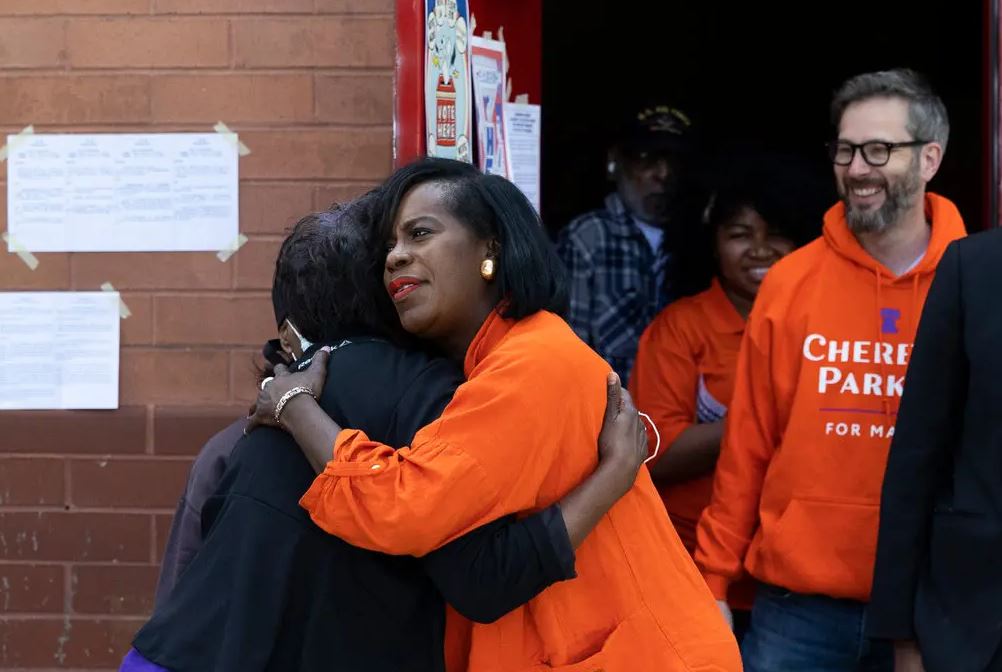Former state representative and City Council member Cherelle Parker, who ran on a platform of increasing police presence, was declared the winner of the Democratic nomination for mayor of Philadelphia on Tuesday night, beating out a crowded field of competitors who had all hoped to be seen as the saviour of the city’s plight.
Ms. Parker would become the city’s 100th mayor and the first woman to occupy the position if she were to win in November, which is all but guaranteed in a city Democrats Republicans than seven to one.
Ms. Parker, 50, was the only Black mayoral candidate out of the top five candidates in a city where Black people make up more than 40% of the population. She had backing from both established Democrats and labour organisations, as well as from the predominantly Black communities of north and west Philadelphia. Her willingness to go against the party’s progressives by promising to employ hundreds of police officers and reinstitute what she has dubbed constitutional stop-and-frisk has drawn comparisons to former New York City mayor Eric Adams.
She did, however, claim that many of the ideas she put out originated in the “middle neighbourhoods” of Philadelphia, those regions where the working and middle classes had been fighting to maintain their status in recent years.
She said that solutions should come from inside the community rather than from outsiders who have never been impoverished themselves or lived in an area with high rates of violence and poverty. “I’ve been there, done that.”
Ms. Parker skipped her own Tuesday night celebration of her win. According to a statement sent by her campaign to the Philadelphia Inquirer on Tuesday night, she needed emergency dental surgery the previous week due to a “recent dental issue.”
Ex-City Council member and Republican David Oh is running against her in the main election this November.
If Ms. Parker is elected in November, she would take charge of a city plagued by several issues, most notably a spike in gun violence that has resulted in hundreds of deaths annually. Philadelphians often cite crime as the city’s most pressing concern, yet the city has many other challenges, such as ageing schools and homes, a homeless crisis, an opioid epidemic, and a lack of municipal employees.
Democratic Mayor Jim Kenney was worn down by the long list of problems that needed to be fixed during his second term in office. His focus was on Covid-19, citywide rallies, and an increasing murder rate.
It was crowded from the beginning of the primary to replace Mr. Kenney until its conclusion. No clear frontrunner had developed as of the most recent polling, and all five contenders, who came from diverse backgrounds and regions of town, seemed to have about the same chance of being elected.
Rebecca Rhynhart, a former city controller with a technocratic pitch backed by multiple former mayors; Helen Gym, a former councilwoman backed by Bernie Sanders and a range of other high-profile progressives; Alan Domb, a real estate mogul and two-term City Council veteran; and Jeff Brown, a grocery store magnate and political newcomer.
TV advertising supporting Mr. Brown and Mr. Domb dominated the early days of the contest, but other campaigns quickly entered the battle, and the ad war became more hostile in the closing weeks. The Philadelphia Board of Ethics accused Mr. Brown, who was ahead in the polls at the beginning of the election, of improperly collaborating with a SuperPAC, which brought the issue of SuperPAC spending full circle.
Despite the expensive and sometimes divisive campaigns, none of the candidates stood out to Philadelphia’s busy voters.
Large numbers of voters were still uncertain in the most recent surveys leading up to the election, but many of them seemed to break in the end for Ms. Parker, who won by a wider margin than many had anticipated.
In contrast to other contests in the state, Ms. Parker’s mild win in Philadelphia stood out. In Pittsburgh’s home county of Allegheny, progressives swept Tuesday’s primaries, securing the nominations for county executive and district attorney as well as other key seats in the Democratic Party.
On Tuesday, Heather Boyd won a special election in southeast Delaware County, giving Democrats a narrow majority in the Pennsylvania House. Democratic heavy hitters like Vice President Joe Biden and Pennsylvania Governor Josh Shapiro have pushed this election as essential to preserving reproductive rights in the state.
A Republican state House seat in north-central Pennsylvania was held by Michael Stender, a school board member and fireman, in a separate special election.

